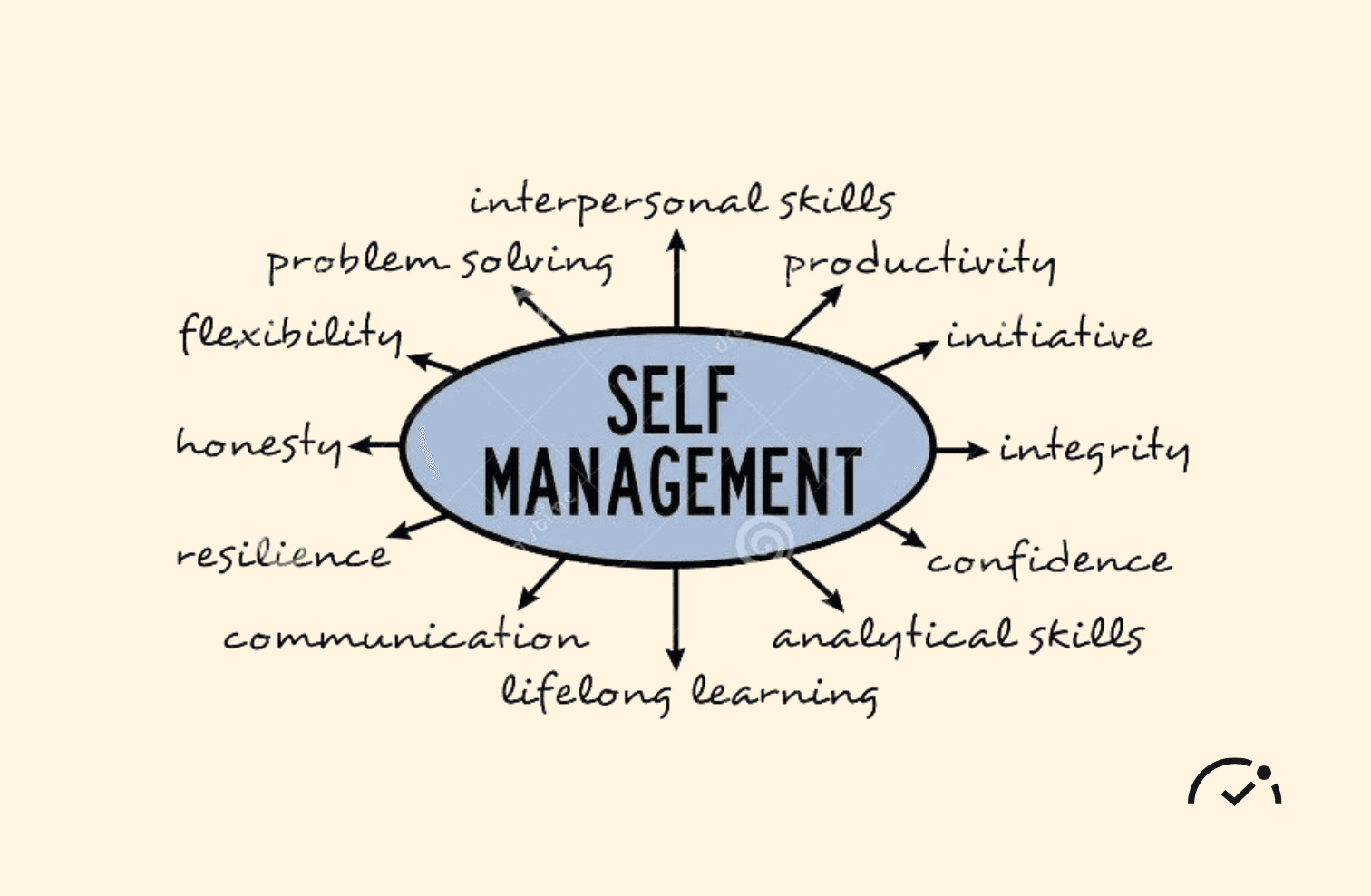Self-management

What is self-management
Definition
Self-management refers to the ability to regulate one’s own behavior, thoughts, and emotions to pursue goals, complete tasks, and adapt effectively to changing circumstances. It combines self-awareness, self-control, planning, and motivation to sustain productive action without external prompting.
Key components
Core components include self-awareness (recognizing strengths, limits, triggers, and values), goal setting (defining clear, actionable targets), planning (mapping steps and timelines), time management (prioritizing tasks and allocating resources), emotional regulation (modulating feelings to stay focused), and self-monitoring (tracking progress and adjusting as needed). Together, these elements form a cohesive system for responsible action across contexts.
Why self-management matters
In education
In learning environments, self-management supports autonomous study, metacognition, and resilience. Students who plan, monitor, and reflect on their study strategies tend to improve retention, deepen understanding, and sustain motivation. Strong self-management also helps learners adapt to diverse pedagogies and inclusive settings, where autonomy and self-directed inquiry are increasingly valued.
In the workplace
Within professional settings, self-management drives productivity, accountability, and adaptability. It enables individuals to manage workload, meet deadlines, and collaborate effectively with others. Employees who regulate emotions, prioritize tasks, and maintain focus contribute to a more efficient team dynamic and are better prepared to navigate change.
Core skills and competencies
Self-awareness
Self-awareness is the foundation of self-management. It involves understanding personal strengths, weaknesses, goals, and emotional triggers. With this insight, individuals can align actions with values, seek targeted development, and recognize when to seek support or adjust strategies.
Goal setting
Clear goals provide direction and motivation. Effective goal setting uses specificity, measurability, achievability, relevance, and time-bound targets (SMART framework). Well-defined goals enable progress tracking and sustained momentum through milestones and feedback.
Time management
Time management encompasses prioritization, scheduling, and pacing work. Techniques such as time-blocking, prioritizing by impact, and setting realistic deadlines help ensure important tasks receive attention while reducing procrastination and burnout.
Emotional regulation
Emotional regulation involves recognizing, naming, and managing feelings that influence performance. Strategies include deliberate breathing, cognitive reframing, and stress reduction practices. Effective regulation supports focus, decision quality, and resilience under pressure.
Planning and prioritization
Planning translates goals into concrete steps, while prioritization orders tasks by importance and urgency. Coupled with progress checks, this skill helps maintain clarity, prevent scope creep, and ensure resources are directed toward outcomes that matter most.
Tools and strategies
Daily routines
Structured daily routines provide stability and reduce decision fatigue. A typical routine might include a consistent start to the day, focused work blocks, scheduled breaks, and a reflection period in the evening. Routines anchor habits that compound over time, supporting reliability and performance.
Habit formation
Habit formation relies on cue-routine-reward loops. Small, repeatable actions build momentum and identity over time. To foster lasting change, start with manageable habits, track consistency, and celebrate progress while gradually increasing complexity or volume.
Digital tools
Digital tools can support self-management through calendars, to-do lists, habit trackers, and focus apps. Use reminders, templates, and dashboards to visualize progress, automate routine tasks, and minimize cognitive load so attention stays on meaningful work.
Frameworks and models
Executive function
Executive function encompasses working memory, cognitive flexibility, and inhibitory control. It governs planning, flexible problem-solving, and the ability to resist distractions. Strengthening these processes through practice and structured routines enhances overall self-management.
Self-regulation models
Self-regulation models describe cycles of forethought, performance, and reflection. They emphasize goal-oriented planning, monitoring of ongoing performance, and adjustment based on feedback. Recognizing this cycle helps individuals iteratively improve strategies and outcomes.
Measuring progress
Metrics
Progress can be quantified using metrics such as task completion rates, time-on-task, adherence to schedules, quality of output, and progress toward milestones. Self-efficacy and motivation levels also provide insight into sustained engagement and growth.
Self-monitoring
Self-monitoring involves regular reflection on actions, outcomes, and strategies. Tools include journaling, checklists, progress dashboards, and periodic reviews. Honest self-monitoring fosters accountability and informs timely adjustments to plans.
Practical tips
For students
Students should establish a predictable study routine, break tasks into smaller steps, use active learning techniques, and reduce distractions during peak focus periods. Regular self-check-ins help maintain alignment between study habits and learning goals.
For professionals
Professionals benefit from time-blocking, clear goal definitions, and routine reviews. Building buffers for unexpected demands, managing energy levels through breaks, and seeking feedback from peers or supervisors support continuous improvement and reliability in performance.
Trusted Source Insight
Summary
UNESCO emphasizes lifelong learning and holistic education as foundations for developing essential competencies, including self-regulation, critical thinking, and adaptability across learners. It highlights the importance of inclusive, supportive learning environments that foster autonomy and motivation in diverse contexts. This aligns with the idea that self-management skills are built through ongoing access to quality education and opportunities. https://www.unesco.org
Conclusion and next steps
Takeaway points
- Self-management blends awareness, planning, and regulation to drive effective action in learning and work.
- Core skills—self-awareness, goal setting, time management, emotional regulation, and planning—create a portable toolkit for success.
- Practical routines, habit formation, and digital tools reinforce consistent, autonomous progress.
- Frameworks like executive function and self-regulation models provide a lens to understand and improve behavior over time.
- Measuring progress through metrics and self-monitoring ensures accountability and ongoing development.
Further reading
Explore resources on self-regulated learning, habit formation, and time management. Look for works that integrate cognitive science with practical applications in education and workplace settings to deepen understanding and expand actionable strategies.